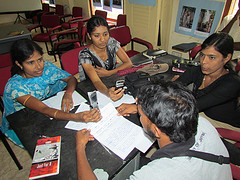Eric Stoller wrote a blog post about the topic of student affairs graduate programs and technology on InsideHighered.com. Specifically, he wanted to know which graduate programs are leading the way when it comes to including technology in their curricula. Below is the comment I shared coming from someone who does not have a Master’s degree in Student Affairs but does have several years of experience working from both the functional and IT sides of student affairs.
=============================================================================
Thanks for asking this question Eric. The topic of technology in student affairs is indeed very big and as you pointed out, bigger than social media. To get an idea of what technologies are used in student affairs, here is the information systems portfolio (http://sist.sa.ucsb.edu/Portfolio.aspx) of the central student affairs IT at UCSB where I work. I apologize that this is still in pdf (for now).
There are aspects to technology that should be studied including policies, practices, staffing and the technologies themselves. Dr.Will Barratt from Indian State University wrote about the topic of Managing IT in Student Affairs in May, 2001. Here’s the article: http://studentaffairs.com/ejournal/Spring_2001/will2.html.
Leslie Dare, the Director of Student Affairs Technology Services at NC State University discussed the topic of Technology, Student Affairs and Graduate Programs on Highered Live with Eric himself – http://higheredlive.com/technology-student-affairs-and-graduate-programs/. She actually taught a course on Technology in Student Affairs as well. Here’s the description – http://www4.ncsu.edu/~ladare/eac595/.
I don’t have a Master’s degree in student affairs, so I can only offer my perspective from my several years of experience in both functional and IT units in student affairs. Please take my perspective with a grain of salt.
What I think should be considered as an approach in student affairs graduate programs with regards to technology is to examine technology in the context of theoretical frameworks and practices and apply them in what I consider realities of today (changing demographics, advancement in technology, budgetary constraints). I think this perspective is similar to Kevin Guidry’s point.
I work full-time in IT and I even I don’t have enough time to learn all the different areas such as database management, server/network support, security, procurement, accessibility and software development. These areas don’t even include having to learn emerging technologies, which in my case, I spend time learning at night. I wouldn’t expect practitioners to spend their time learning all these technologies in addition to the demands of their business duties. The question of how much should practitioners know to be considered competent is another topic in itself.
From an IT perspective, what has been really helpful when working with functional units is when practitioners have been able to articulate their business processes/needs, the “why” questions/answers. If they can provide us with some ideas on how to build it, even better, but not required. I think as technology becomes even more significant in student affairs, more so than today, practitioners who have the knowledge in business process analysis, on top of practical experience/understanding of theoretical frameworks will be the ones in demand. Regardless if the technical solution sought is to be developed by IT, bought from a vendor, or utilize free services on the web, there is still the need to understand how these solutions would address business needs. Let’s take social media. I think it’s just a matter of time when student affairs will start to adopt social media for other uses beyond marketing and engaging with customers. I can see student affairs using social media for operational and student service uses.
Personally, I’ve always relied on the knowledge of our functional units to guide my team and I in how to approach a technology solution. There’s the ideal technical solution that IT may want to build and provide but then there’s the solution(s) that meets the realities and demands of day-to-day activities.
Kevin Guidry shared his research on the history of technology and student affairs with me months ago and it is interesting that given the significant role of technology in student affairs throughout its history that we’re still asking this question.
As an aside, I had also asked some feedback on twitter, facebook, google+ andlinkedin asking how student affairs practitioners use technology in their line of work. Unfortunately, I only received 10 responses. I’m left wondering too if it was wrong timing, the topic is not interesting or I just posed the questions wrong. In any case, If you happen to be reading this, I would love to have some of your time to answer a few questions here: https://joesabado.com/articles/technology/student-affairs-technology-questionnaire/.
thanks:)
Joe

